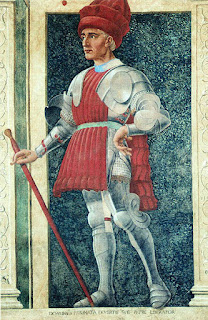Genoa had a lot of ports in the Black Sea, and decided it had to rid the area of its greatest rival, Venice. Venice had already lost control of Dalmatia on the east coast of the Adriatic: King Louis I of Hungary had conquered it, and in 1379 had Hungarian forces to the north of Venice itself. Hungary had allied itself with Genoa, as had Padua, who created a block to the west of Venice.
Venice still had the sea accessible to its ships, and still had a strong presence in the Levant. For allies, it had Bernabo Visconti in Milan, whose mercenaries invaded Genoa but were defeated in 1379. Venice also had an ally in Byzantine Emperor John V Paleologos, restored to his throne in 1379 with the help of Venice after Genoa had helped dethrone him a few years earlier.
The two republics' ships harassed each other all over the Aegean and Levant, but ultimately Genoa decided to sail into the lagoon of Venice itself. Genoa (with help from Padua and Hungary) attacked the fishing port of Chioggia (see illustration) on 16 August 1379, overcoming a Venetian garrison of 3000 men. Within days Venice was surrounded by forces allied with Genoa.
The Venetian senate wanted to negotiate peace, but Genoa boasted that it would "bit and bridle the Horses of Saint Mark" (the famous four bronze horses at St. Mark's Basilica). Venice knew this meant a fight to the finish.
A Venetian fleet that had been plundering Genoese ships in the Aegean reached the area on 1 January 1380, blockading the Genoese ships from departing. Genoa suddenly was the one who was trapped. Months of skirmishes to re-take Chioggia went on while Genoa hoped for reinforcements. Venice, more familiar with the shallow waters, conducted night-time attacks on the Genoese ships. Venice also sunk unneeded ships with stones (that could be removed later to re-float the ships) to create barriers that the heavier Genoese galleys could not get past.
The final battle, the Battle of Chioggia, took place on 24 June 1380. Venice used cannons on board their ships for the first time. The blockaded Genoese were starving from lack of supplies, and ultimately surrendered. Venice regained control of Adriatic shipping, and a year later the Peace of Turin was signed.
The Treaty of Turin was mediated by Amadeus VI of Savoy and signed in 1381. It deserves a closer look, but that's for tomorrow.



